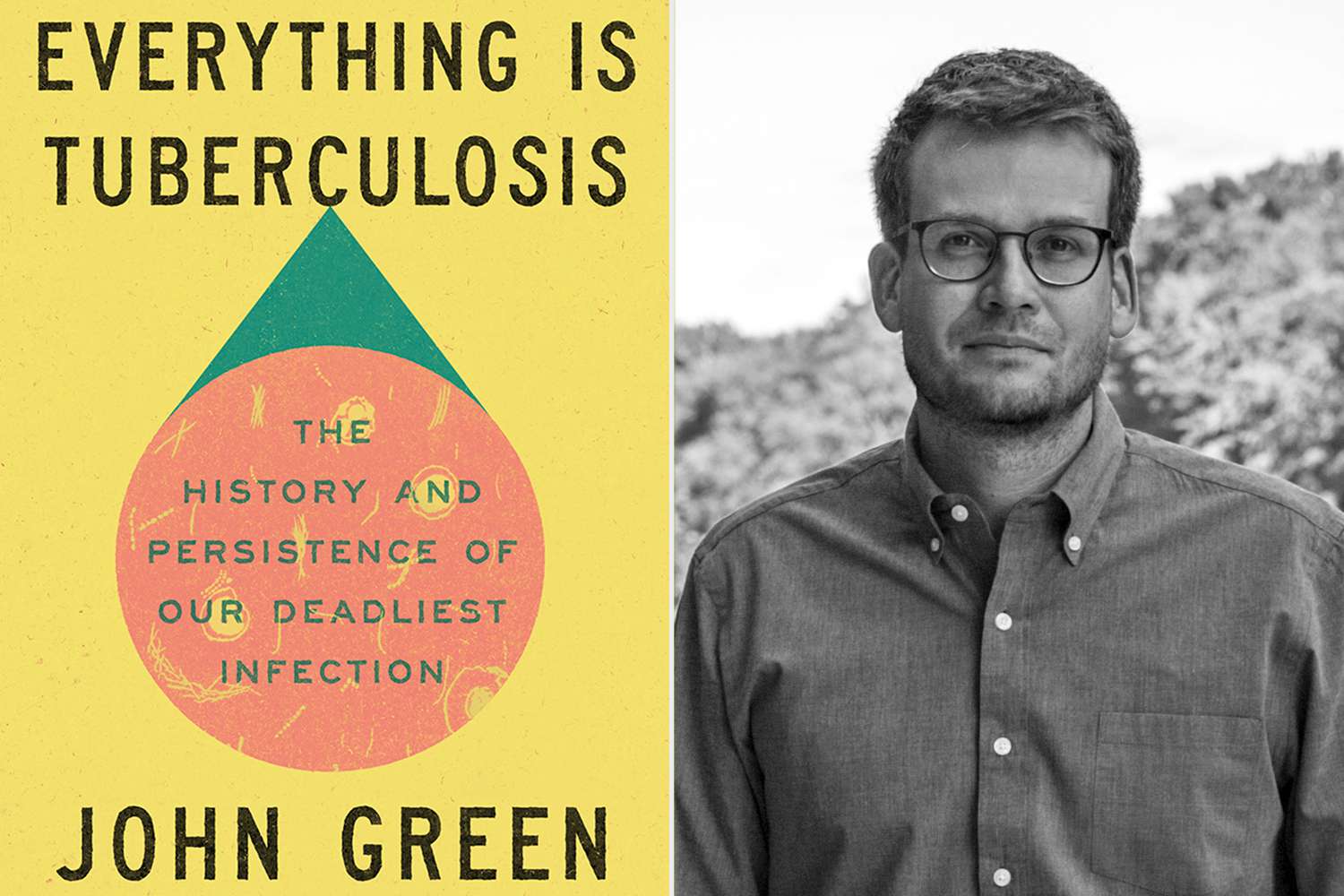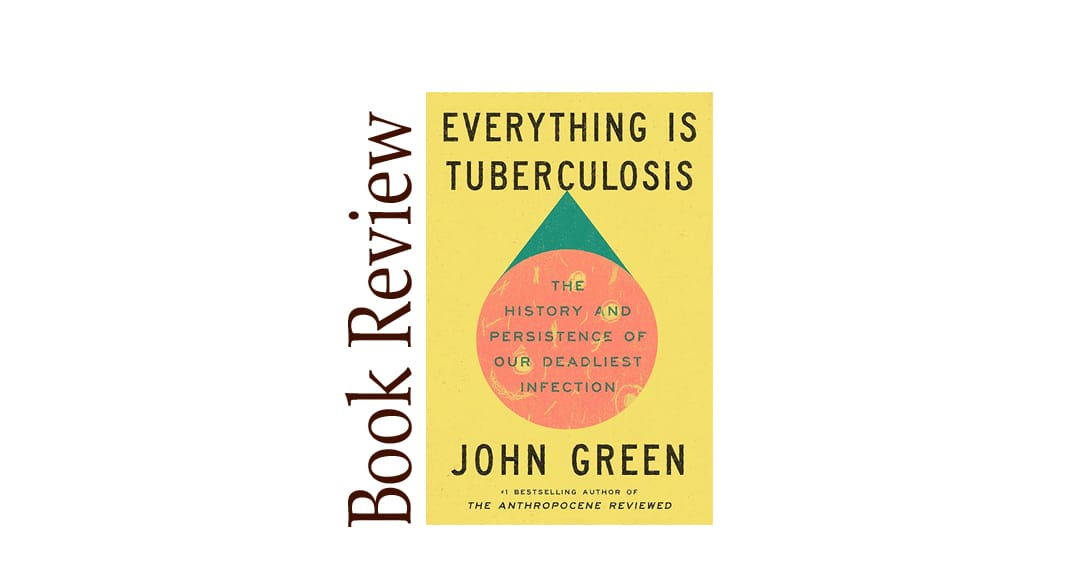- Date Published:
March, 2025 - Length:
208 pages—Listening Time: 5 hr 35 minutes - Genre:
NonFiction, Medical History, Disease and Health - Setting:
Historial periods when tuberculosis was prevalent to modern day; Sierra Leone and worldwide references - Awards:
Heartland Booksellers Award Winner Non-Fiction 2025; Great Reads from Great Places (Indiana) 2025 - Languages:
English - Sensitive Aspects:
Illness, death, child death, child abuse, ableism, antigay bias, gender and transgender discrimination, racism, poverty, medical system failures, social stigma, malnutrition, colonialism, and graphic depictions of suffering - Movie:
There is a documentary-style video interview with John Green on PBS - Recommended for Book Club:
Yes. The information presented in this book is fascinating.
Some books grab you by the heart, others grab you by the mind. Everything Is Tuberculosis by John Green somehow manages to do both. On the surface, it sounds like a strictly medical topic: a deep dive into the history, science, and lingering impact of tuberculosis, the disease that shaped centuries of human life. You might expect something dense or clinical. But under Green’s expert hand, this potentially dry subject blossoms into something fascinating, deeply human, and surprisingly intimate.
Green approaches tuberculosis not just as a writer but as a thoughtful observer of human fragility. His trademark blend of curiosity, empathy, and humor turns what could have been a textbook into a conversation, one that spans labs, hospital wards, and the inner workings of his own mind. I especially loved how he wove in honest reflections on his OCD, showing how his obsessive habits both help and hinder his understanding of illness and fear. The result is part memoir, part science writing, and part philosophical meditation on being alive in an age when microbes still have the upper hand.
By the time I finished, I’d learned more about TB than I ever expected to, but I’d also learned something about vulnerability, resilience, and the strange beauty of paying close attention. I gave Everything Is Tuberculosis a solid 8 stars and came away thinking: only John Green could make bacteria feel poetic.

Everything Is Tuberculosis by John Green explodes the myth that TB is a problem of the past, plunging readers into a gripping story where injustice, not medicine, is the greatest villain of all. At the book’s heart is Henry Reider, a teenager in Sierra Leone whose journey is both harrowing and deeply human: initially misdiagnosed, then subjected to brutal regimens of outdated antibiotics, and finally forced to battle drug-resistant tuberculosis due to gaps in global healthcare. As Henry’s mother walks miles for treatment and doctors defend their right to give him hope, the story unfolds against a backdrop where social stigma, poverty, and indifference allow a curable disease to flourish and claim millions every year.

Green threads rich historical analysis and urgent advocacy through every page, painting TB as “a disease of poverty that walks the trails of injustice and inequity,” even though effective treatments have existed for decades. Instead of stories of miraculous recovery, Green delivers hard-won hope: Henry survives thanks to relentless care, finally receiving a personalized drug regimen rarely available to kids in poor nations. Now a university student and advocate, Henry’s journey proves that TB is not a medical mystery but a test of humanity’s willingness to provide care where it’s needed.
But Green doesn’t let readers off easy. He dares us to ask why millions still die each year from a disease we know how to cure, using Henry’s story as a rallying cry for compassion, accountability, and radical change. With sparkling prose, honest humor, and deep compassion, Everything Is Tuberculosis turns Henry’s fight into a clarion call against preventable suffering.

Every RWW reader should read Everything Is Tuberculosis by John Green. It blends riveting storytelling, global health insight, and deeply human experiences in a way that is both eye-opening and emotionally resonant. This book is a must-read for any thoughtful audience interested in compelling narratives, social justice, and the realities of modern medicine.
Emotional and Personal Storytelling
John Green grounds the book in the real-life story of Henry, a boy from Sierra Leone, offering readers a firsthand look at what TB means on a personal level: from the medical hardships to the social stigma and economic burdens that come with the disease. Through Henry’s battle—and ultimate triumph—over TB, Green shows that this ancient disease is not just a medical problem but also a matter of access, justice, and human will.
Focus on Injustice and Social Change
The book spotlights the persistent injustice of a preventable and curable illness killing over a million people every year, mostly among society’s most marginalized. Green traces TB’s history through systemic racism, poverty, and policy failures, and forcefully argues that the continued suffering is a direct result of collective choices, not medical impossibility. He emphasizes the moral responsibilities of societies and individuals to push for change and equitable healthcare.
Accessible, Thought-Provoking, and Engaging
Despite dealing with difficult topics, Everything Is Tuberculosis is quick to read, thanks to Green’s accessible writing style, memorable anecdotes, and ability to explain complex health issues in clear language. The book weaves together memoir, research, and advocacy, making it hard to put down.
Universal Appeal
Readers of all backgrounds will find relevance in the book’s exploration of mortality, hope, resilience, and the importance of empathy. Whether drawn by the global health perspective or by Green’s celebrated prose, readers are challenged to rethink their views on disease, responsibility, and the power of human connection.
Reasons Every Reader Should Read It:
- Illuminates the human side behind headline statistics and global health crises
- Makes a passionate case for justice and the need for ongoing activism
- Delivers gripping narrative arcs and a satisfying blend of fact and feeling
- Encourages empathy, awareness, and action—qualities crucial at any age
- Models how an everyday reader can help create positive change in the world
In sum, Everything Is Tuberculosis is more than a book about disease; it’s a call to see, understand, and act on the injustices woven through public health. It’s an essential, unforgettable read for any thoughtful book lover.


Get John Green Books
John Green captivates readers with heartfelt, thought-provoking stories that blend humor, wisdom, and unforgettable characters.

Here is a list of books similar to Everything Is Tuberculosis by John Green. These books all explore themes of illness, science, medicine, and personal reflection in deeply engaging and accessible ways:
- Sick by Porochista Khakpour
Khakpour’s memoir details her years of struggle with chronic Lyme disease, exploring the challenges of diagnosis, disbelief, and the isolation that illness brings, written with poetic clarity and emotional honesty. - The Pandemic Century by Mark Honigsbaum
This book chronicles a hundred years of outbreaks, including tuberculosis and other major diseases, combining historical research with vivid storytelling to illuminate how society and science respond to epidemic threats. - Blind Spots: When Medicine Gets It Wrong by Melissa K. Creary
A powerful look at how medical bias and systemic inequities affect patients, focusing on overlooked conditions and the importance of listening to those living with chronic illness. - Phantom Plague: How Tuberculosis Shaped History by Vidya Krishnan
Explores the global impact of tuberculosis, from its history to current challenges, blending investigative journalism with stories from patients and doctors on the disease’s front lines. - The Black Angels: The Untold Story of Nurses Who Helped Cure Tuberculosis by Maria Smilios
Follows a group of heroic Black nurses who fought against prejudice and disease in New York City’s TB wards, offering a moving narrative of compassion and perseverance. - The Remedy: Robert Koch, Arthur Conan Doyle, and the Quest to Cure Tuberculosis by Thomas Goetz
Recounts the race to understand and cure tuberculosis at the turn of the 20th century, bringing together medical discovery and personal drama in unforgettable detail. - The Body: A Guide for Occupants by Bill Bryson
Bryson investigates the human body’s wonders and frailties, with chapters on disease and medicine told through witty anecdotes, personal facts, and compelling science writing. - The Hour of Our Death by Philippe Ariès
A classic work examining society’s evolving relationship with disease, dying, and mortality, interlacing history, philosophy, and personal stories into a sweeping account. - The Ghost Map by Steven Johnson
This is the story of a deadly cholera outbreak in Victorian London, focusing on the intersection of city planning, epidemiology, and the human element in public health emergencies. - The Anthropocene Reviewed by John Green
A collection of essays where Green reviews facets of the human condition, including illness and health, blending scientific research with highly personal experiences and reflections. - The Light Eaters by Zoë Schlanger
A blend of reporting and memoir, exploring the science and culture around chronic illness, autoimmune disorders, and the lived realities of patients. - Fevers, Feuds, and Diamonds: Ebola and the Ravages of History by Paul Farmer
Tackles the social, political, and medical history behind global infectious diseases, emphasizing personal stories and advocacy for better healthcare worldwide.


Comments